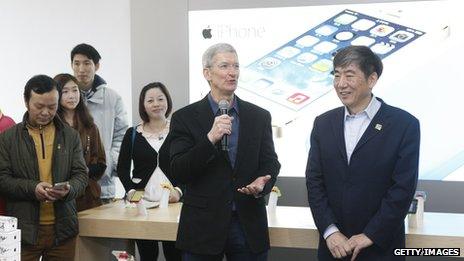Apple hits back at China over iPhone privacy claims
- Published

Apple has denied its iPhone threatens Chinese national security after the state broadcaster carried reports it could transmit "state secrets".
On Friday a researcher told Chinese Central Television the iOS 7 frequent locations function collected data on where individual iPhone users went.
It added it did not have access to the data, which was locally stored, was committed to protecting privacy, and that users could turn off the function.
"Unlike many companies, our business does not depend on collecting large amounts of personal data about our customers," Apple said in a statement.
A "crowd-sourced" database of known locations collected from millions of devices was used to speed up its location-finding service, it said.
But no data sent from individual phones could be used to identify the users.
It said: "Calculating a phone's location using just GPS satellite data can take several minutes.
"iPhone can reduce this time to just a few seconds by using pre-stored WLAN hotspot and cell tower location data in combination with information about which hotspots and cell towers are currently being received by the iPhone.
"We do this at the device level.
"Apple does not track users' locations - Apple has never done so and has no plans to ever do so."
Apple made about 6% of the smartphones in China, the researcher said.
'Discriminatory'
In June 2013, China's First Lady, Peng Liyuan, was criticised for using an iPhone during a diplomatic trip to Mexico amid a row between Beijing and the company.
Chinese state media had attacked Apple's differing warranty policies in China and the rest of the world as discriminatory, prompting an apology from the company's chief executive, Tim Cook.
The reputations of US technology companies have also taken a blow in China following former US intelligence analyst Edward Snowden's claims that some were involved in passing data to the National Security Agency.
However, Apple said it had "never worked with any government agency from any country to create a backdoor in any of our products or services".
"We have also never allowed access to our servers. And we never will. It's something we feel very strongly about," it added.
China has also banned government agencies from buying new computers using Microsoft's Windows 8 operating system and placed a greater emphasis on developing its own technology.
The system was branded a threat to security in June this year after being banned in May.
- Published9 July 2014
- Published23 December 2013
- Published20 May 2014
- Published30 January 2014
- Published23 December 2013